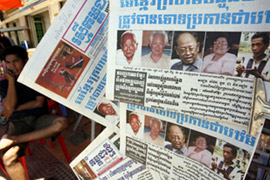First Khmer Rouge trial opens
UN-backed Cambodian war crimes trial for former Khmer Rouge leader gets under way.

“The formal opening of the first trial is a hugely important day for Cambodia,” Helen Jarvis, a spokeswoman for the tribunal, said.
“It will be a milestone on the road to justice.”
At least 1.7 million people died of starvation, disease or execution during the Khmer Rouge rule over Cambodia between 1975 and 1979.
Many died in what later became known as the “killing fields”
Duch, 65, is accused of murder, torture, rape and persecution, and faces life imprisonment if convicted. Cambodia does not have a death sentence.
First of five
 |
| Ordinary Cambodians have awaited justice over the “killing fields” for decades [Reuters] |
Four other surviving former Khmer Rouge officials are in detention awaiting trial on similar charges.
They include Nuon Chea, the group’s former deputy leader also known as “Brother Number Two”; Khieu Samphan, the former Khmer Rouge head of state; Ieng Sary, the ex-foreign minister; and his wife Ieng Thirith, who was the social affairs minister.
Pol Pot, the group’s former supreme leader and so-called “Brother Number One”, died in a jungle hideout in 1998.
Duch, a former maths teacher, headed the S-21 prison, the largest Khmer Rouge interrogation facility, where up to 16,000 men, women and children perished after suffering gruesome torture.
William Smith, one of the prosecutors, said the initial stage of the hearing beginning on Tuesday was expected to last one or two days and will involve procedural matters that will “decide the shape and structure of the trial”.
He said the judges will then finalise the witness list and decide on preliminary legal objections, adding that full testimony was not expected until March.
Last chance
The joint war crimes tribunal, established in 2006 after nearly a decade of negotiations between Cambodia and the UN, is seen as the final chance for Cambodians to see justice done for the Khmer Rouge’s atrocities.
But the run-up to the trial has been marred by claims that the government is interfering to stop the prosecution of further suspects, as well as allegations that Cambodian court staff were paid kickbacks for their jobs.
“Any hint of political manipulation at the tribunal will undermine its credibility with the Cambodian people,” Sara Colm, a Cambodia-based senior researcher at Human Rights Watch, said.
“Until allegations of corruption and improper interference by the government are investigated and resolved, the tribunal’s integrity as a legitimate and independent court will remain in question.”
But for ordinary Cambodians, the trial remains their only chance to heal the wounds of a traumatic period that saw almost a quarter of the population wiped out.